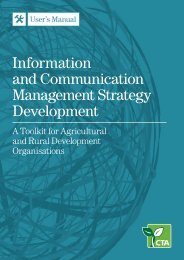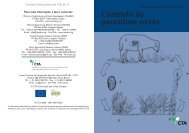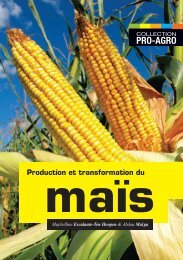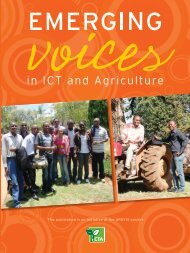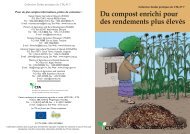Policy framework for Pastoralism in Africa
Policy framework for Pastoralism in Africa
Policy framework for Pastoralism in Africa
- No tags were found...
Create successful ePaper yourself
Turn your PDF publications into a flip-book with our unique Google optimized e-Paper software.
<strong>in</strong>frastructure. In addition, pastoralist areas cont<strong>in</strong>ue to be affected by violent conflict, which <strong>in</strong>some regions <strong>in</strong> protracted and h<strong>in</strong>ders opportunities <strong>for</strong> long-term economic growth. The developmentchallenges of pastoral areas <strong>in</strong> <strong>Africa</strong> are multi-dimensional and complex but nevertheless,need urgent attention. Poverty, environmental degradation, marked ra<strong>in</strong>fall variability, humanand animal diseases, conflicts and civil strife must be dealt with simultaneously. Inappropriatedevelopment policies, <strong>in</strong>effective <strong>in</strong>stitutional sett<strong>in</strong>gs, unfair market relationships and <strong>in</strong>creasedpressure on pastoral ecosystems add to these challenges, and place many pastoralists <strong>in</strong> a situationof worsen<strong>in</strong>g vulnerability.The commitment to the <strong>Policy</strong> Framework <strong>for</strong> <strong>Pastoralism</strong> <strong>in</strong> <strong>Africa</strong> arises from the need <strong>for</strong> acont<strong>in</strong>ent-wide plat<strong>for</strong>m to effectively address, <strong>in</strong> a holistic manner, the many challenges confront<strong>in</strong>gpastoral communities. Such a policy <strong>framework</strong> will def<strong>in</strong>e the guidel<strong>in</strong>es, pr<strong>in</strong>ciples and modalities<strong>for</strong> comb<strong>in</strong><strong>in</strong>g all the essential elements needed <strong>for</strong> a better understand<strong>in</strong>g of pastoral issues, and<strong>for</strong> the development and implementation of <strong>in</strong>terventions to address these issues. While facilitat<strong>in</strong>gengagement with regional and country-level plann<strong>in</strong>g processes, the new policy <strong>framework</strong> will playa catalytic role <strong>in</strong> promot<strong>in</strong>g development <strong>in</strong> pastoral communities by provid<strong>in</strong>g the <strong>Africa</strong>n plat<strong>for</strong>mtool <strong>for</strong> harness<strong>in</strong>g the political, economic and technical resources needed to empower pastoralcommunities to better manage their resources, <strong>for</strong> their own long-term benefit.1.2 Objectives of the <strong>Policy</strong> Framework <strong>for</strong> <strong>Pastoralism</strong> <strong>in</strong> <strong>Africa</strong>The <strong>Policy</strong> Framework <strong>for</strong> <strong>Pastoralism</strong> <strong>in</strong> <strong>Africa</strong> will address the root causes of pastoral vulnerabilityon the cont<strong>in</strong>ent. With<strong>in</strong> the AUC, the <strong>framework</strong> is driven by recognition that reduction of pastoralpoverty is central to the achievement of the Millennium Development Goals (MDGs), notleast because pastoralists represent a substantial segment of the population <strong>in</strong> many <strong>Africa</strong>n countries.Many past attempts to support pastoral development failed to recognize the strengths ofpastoralism, and did not balance the need <strong>for</strong> greater pastoral representation and good governance,with appropriate technical approaches. Pastoral development ef<strong>for</strong>ts must go beyond s<strong>in</strong>gle-sectortechnical approaches, and embrace <strong>in</strong>digenous knowledge, <strong>in</strong>novations <strong>for</strong> susta<strong>in</strong>able naturalresources management, effective governance, and further <strong>in</strong>tegration of pastoral livelihoods withexpand<strong>in</strong>g market opportunities.The two objectives of the <strong>Policy</strong> Framework <strong>for</strong> <strong>Pastoralism</strong> <strong>in</strong> <strong>Africa</strong> are to:Objective 1Secure and protect the lives, livelihoods and rights of pastoral peoples and ensure cont<strong>in</strong>entwidecommitment to political, social and economic development of pastoral communities andpastoral areas.Objective 2Re<strong>in</strong><strong>for</strong>ce the contribution of pastoral livestock to national, regional and cont<strong>in</strong>ent-wideeconomies.In specific terms, the policy <strong>framework</strong> is <strong>in</strong>tended to:a. Provide a both a vision and a practical <strong>framework</strong> <strong>for</strong> achiev<strong>in</strong>g multiple development objectives<strong>in</strong> pastoral areas; catalyz<strong>in</strong>g political will and rais<strong>in</strong>g awareness among key stakeholders,10 <strong>Policy</strong> <strong>framework</strong> <strong>for</strong> <strong>Pastoralism</strong> <strong>in</strong> <strong>Africa</strong>




